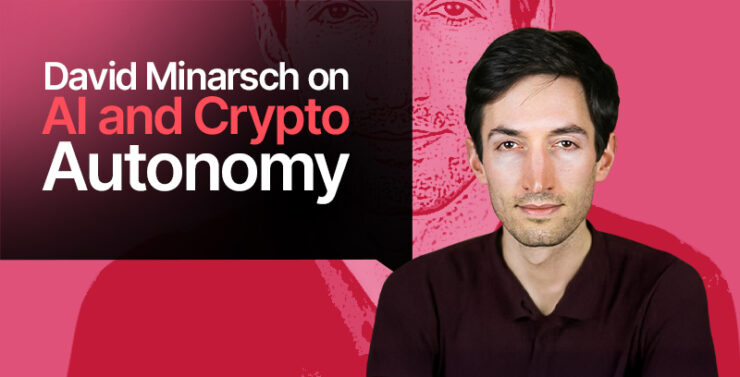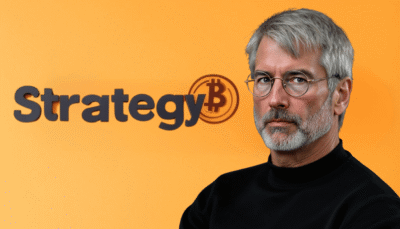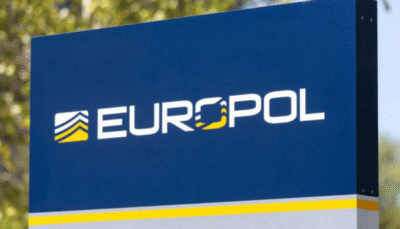Few people sit at the crossroads of AI, economics, and decentralized systems quite like David Minarsch. With a PhD in applied game theory from Cambridge and the founding of two transformative platforms—Valory and Olas—Minarsch is reimagining how humans and machines can collaborate in the digital age. He isn’t just engineering smarter systems; he’s laying the foundation for a future where AI agents are autonomous, open-source, and truly owned by the users who deploy them.
“You own your keys to own your coins, [so] in AI you should own your weights to own your AI brain, and you should own the open source code and code underlying your agents.” Minarsch stated during his appearance on The CoinRock Show.
This ethos underpins everything he builds at Olas, a decentralized network of AI agents designed to operate independently while coordinating value for their users. These aren’t passive tools. They’re self-operating, goal-executing entities built with purpose, modularity, and ownership in mind.
Game Theory Meets Crypto Infrastructure
Minarsch’s journey began with game theory, a discipline obsessed with strategy, incentives, and agency.
“In game theory, you define actors as agents,” he explained.
“They take action in a game… and describe how much utility or wealth they get from interacting with certain strategies.”
That perspective naturally evolved into an interest in agents beyond human players—software agents that could act strategically within complex systems.
Following early ventures in machine learning and unsuccessful startups, Minarsch joined Fetch.AI in 2019 to build one of the first AI agent frameworks in crypto. But the real leap came with the founding of Valory, the lab behind Olas. There, he began refining what an AI agent could be: not just a predictive tool, but an economic participant.
“To build interesting agents, the agent needs to be capable… [and] the agent needs to be able to do things in the real world,” he said.
In crypto, this capability is unlocked through wallets—the very mechanism that enables agents to act economically. Give an agent a wallet, and suddenly, it’s not just computing; it’s participating.
From Domain-Specific to Multi-Agent Systems
Today, Olas supports several agents already in production: Modius (DeFi portfolio manager), Predict (market forecaster), and Agents.fun (influencer engagement). These aren’t isolated widgets—they are part of a growing “multi-agent system,” where different AI agents interact, learn, and specialize.
“Specialized software agents, even if they come from this primordial generalized version, will ultimately be the ones that are economically most relevant,” he argued.
This mirrors how societies evolved through specialization: each agent, like each worker, excels by focusing on what it does best and coordinating with others.
Minarsch’s long-term vision? A general-purpose agent that is transparent, modular, and controlled entirely by its user.
“I would like a general-purpose agent that I can give somewhat arbitrary goals and it will [given within the means of its resources,] execute against them at any given time. I want that system to be super, super transparent, and I want to have ownership of it.”
The Vision of Owned AI
David is deeply critical of the “rented AI” paradigm—where users interact with powerful models hosted and controlled by centralized corporations. Instead, he champions a world in which AI models are not just accessible but ownable. That means open-source codebases, downloadable models, and user control at every level.
“It’s very important that we start owning things more again,” he said.
“Now, increasingly with technology, we have this weird hybrid where even the TV… stops working once certain subscriptions are turned off. The same thing will potentially happen with AI.”
In this worldview, decentralization isn’t just a technical feature; it’s a political statement. Ownership of agents becomes synonymous with autonomy, with freedom, with the very idea of self-sovereignty. It’s why Valory is designed not only as a tech lab but as a platform for community coordination, where tokens facilitate shared ownership and value creation.
Crypto and the Incentive Machine
Building in crypto, for Minarsch, is a strategic choice. The token economy offers a structure for incentivizing decentralized coordination—a feature that’s crucial when building a system composed of many independent agents.
“We’re using incentives to coordinate a network of builders and operators… to bootstrap an ecosystem of user-owned agents,” he explained.
Crypto-native primitives like wallets, tokens, and permissionless execution allow agents to exist without relying on a centralized API gatekeeper.
This intersection of AI and crypto is more than technical synergy. It’s philosophical alignment: both movements are pushing toward disintermediation, empowerment, and ownership. Minarsch sees this clearly.
“Even if you’re just a token holder, you’re not even just a user of the system—you’re still a positive participant of the ecosystem.”
Takeaway?
David Minarsch is not building gadgets. He’s designing a future. In that future, users don’t just use AI—they co-own it. Agents don’t ask for permission—they participate. Systems don’t serve platforms—they serve people. If autonomy is the goal, then ownership, openness, and crypto-native coordination are the only viable path. And for Minarsch, that path is already under construction.
Where to Find David Minarsch
You can follow David Minarsch’s work and insights across platforms:
- X (Twitter): @david_enim
- LinkedIn: linkedin.com/in/davidminarsch
- Medium: @david.minarsch
- GitHub: github.com/DavidMinarsch
David is the co-founder of Valory and a founding member of Olas Network, Olas on X, where he’s building the infrastructure for user-owned AI agents and decentralized autonomy.





